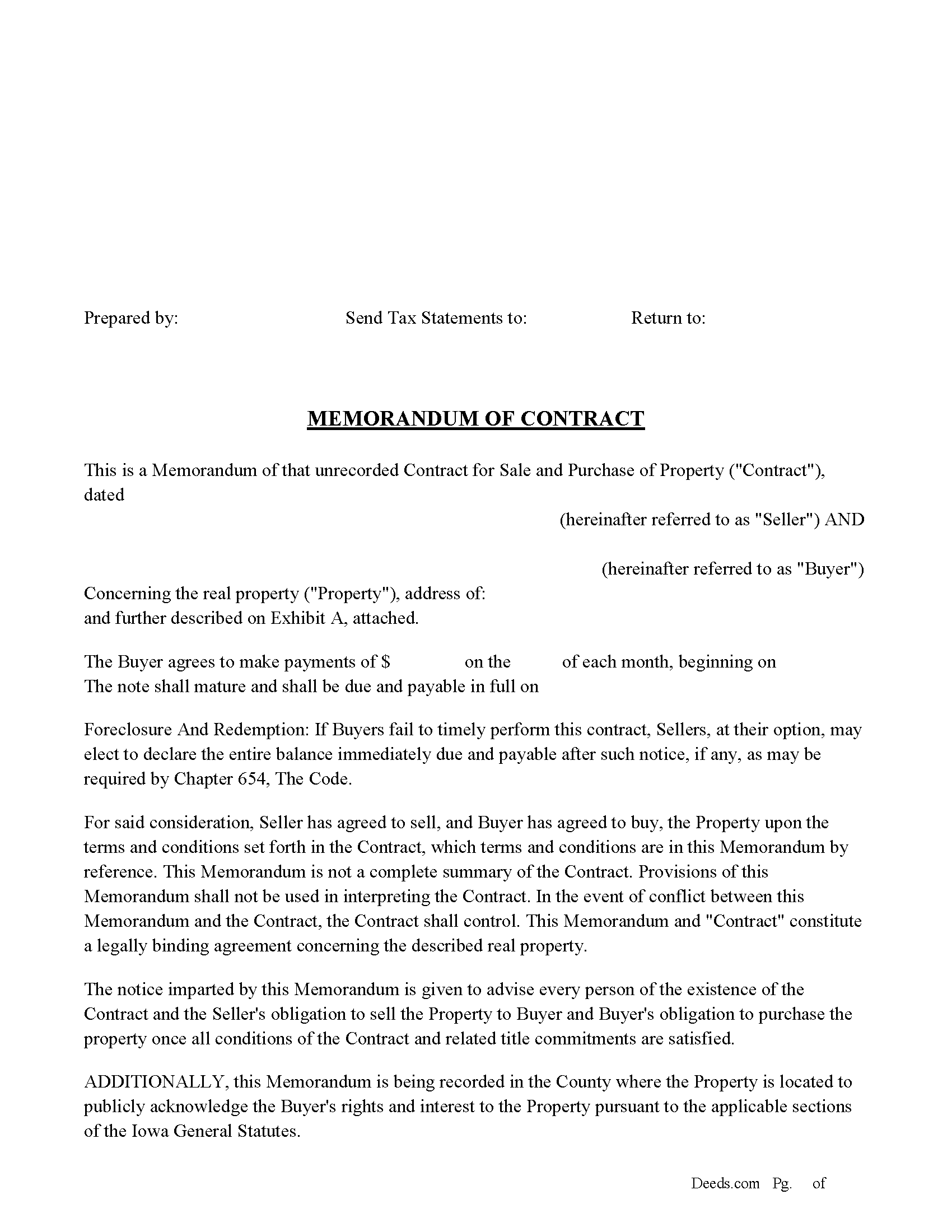Iowa Memorandum of Contract Forms

Iowa Memorandum of Contract Overview

How to Use This Form
- Select your county from the list on the left
- Download the county-specific form
- Fill in the required information
- Have the document notarized if required
- Record with your county recorder's office
In Iowa, under Iowa Code Section 558.46, a Memorandum of Contract can be used as a legal alternative to recording the entire real estate installment sales contract, particularly for residential property. The law provides that when certain residential real estate installment sales contracts are entered into, either the full contract or a memorandum of the contract must be recorded. Below are the key uses and implications of using a Memorandum of Contract under Iowa Code 558.46:
Key Uses of a Memorandum of Contract in Iowa:
1. Public Notice of Buyer’s Interest: The primary purpose of recording a Memorandum of Contract is to put the public on notice that the buyer has an interest in the property under an installment sales contract (contract for deed). This helps protect the buyer from claims by third parties, such as future buyers, lienholders, or creditors, who may otherwise be unaware of the buyer’s interest in the property.
Once recorded, the memorandum provides notice that a contract exists, without revealing all details of the transaction.
2. Satisfying the Recording Requirement: Iowa law under 558.46 requires that certain residential real estate installment sales contracts must be recorded to protect the interests of the parties and ensure transparency in property transactions.
The statute allows for either the entire contract or a memorandum of the contract to be recorded, giving parties the option to record a summary document rather than the full agreement
3. Privacy Protection: A key benefit of using a Memorandum of Contract is that it allows the parties to keep sensitive financial details (e.g., the purchase price, installment payment terms, interest rate) private. While the memorandum must include essential information (like the names of the parties, property description, and date of the agreement), it does not need to disclose the entire contents of the contract.
This allows the parties to protect the privacy of their financial arrangements while still complying with the recording requirement.
4. Avoiding Legal Disputes: Recording the memorandum serves as a protective measure to prevent legal disputes over the property. It establishes that a valid contract exists, preventing the seller from attempting to sell the property to another party without the buyer’s knowledge.
It can also be useful if the seller fails to comply with their obligations under the contract, as the recorded memorandum establishes the buyer’s rights.
5. Complying with Iowa’s Legal Framework: Recording either the entire contract or a memorandum ensures compliance with Iowa law and avoids potential legal issues related to the failure to record. Under Iowa Code 558.46, if the contract is not recorded within 90 days of execution, the seller may be subject to fines and penalties, and the buyer may take steps to record the contract or memorandum to protect their interest.
Information Typically Included in a Memorandum of Contract: (If a real estate contract is required to be recorded under this section, the requirement is satisfied by recording either the entire real estate contract or a memorandum of the contract containing at least the names and addresses of all parties named in the contract, a description of all real property and interests in the real property subject to the contract, the length of the contract, and a statement as to whether the seller is entitled to the remedy of forfeiture and as to the dates upon which payments are due. Mandatory recording of certain residential real estate installment sales contracts. 558.46(4))
Example Scenario of Use:
A buyer enters into a contract for deed to purchase a residential property in Iowa. Rather than record the entire contract, which contains sensitive financial information, the buyer and seller agree to record a Memorandum of Contract. The memorandum includes the essential details, such as the names of the parties, the date of the contract, and the property description. This ensures that the buyer's interest is protected and the public is on notice, while keeping financial details private.
Legal Consequences of Non-Compliance:
If the seller fails to record the contract or memorandum within 90 days as required under Iowa Code 558.46, the buyer has the right to record the contract or memorandum themselves.
Sellers who do not comply with this requirement may face legal penalties, and their failure to record could expose the buyer to risks such as third-party claims against the property.
In Iowa, recording a Memorandum of Contract under 558.46 serves as a critical tool for protecting the buyer’s interest in a property under an installment sales contract, while also allowing for privacy in sensitive financial terms. It fulfills the legal requirement for recording and protects both parties against future disputes or claims by third parties.
Important: County-Specific Forms
Our memorandum of contract forms are specifically formatted for each county in Iowa.
After selecting your county, you'll receive forms that meet all local recording requirements, ensuring your documents will be accepted without delays or rejection fees.
How to Use This Form
- Select your county from the list above
- Download the county-specific form
- Fill in the required information
- Have the document notarized if required
- Record with your county recorder's office
Common Uses for Memorandum of Contract
- Transfer property between family members
- Add or remove names from property titles
- Transfer property into or out of trusts
- Correct errors in previously recorded deeds
- Gift property to others